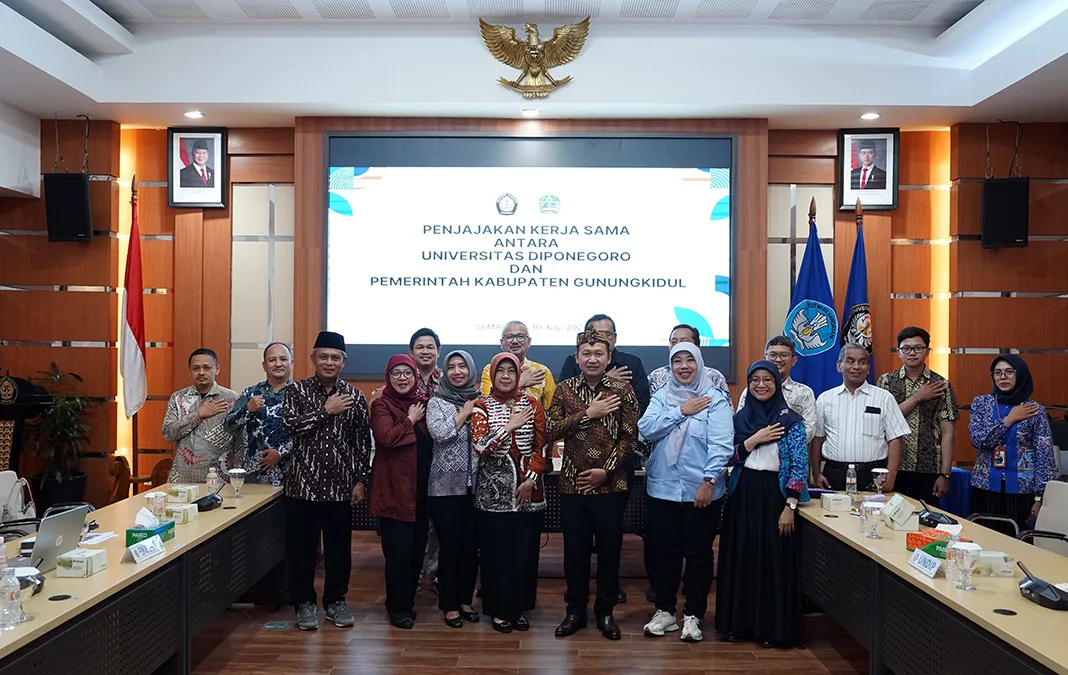UNDIP, Semarang (July 10, 2025) – Universitas Diponegoro (UNDIP) welcomed representatives from the Gunungkidul Regency Government, Yogyakarta Special Region (DIY), for a collaborative meeting on Thursday, July 10, 2025, at the Rectorate Meeting Room in Widya Puraya Building. The session aimed to explore a potential partnership between UNDIP and the regional government to support regional development efforts.
In his remarks, UNDIP’s Vice Rector for Research, Innovation, Collaboration, and Public Communication, Wijayanto, S.IP., M.Si., Ph.D., expressed warm appreciation for the visit. He emphasized the university’s commitment not only to achieving academic excellence but also to contributing meaningfully to society. “To realize UNDIP as a noble and valuable institution, the university is determined to be an educational establishment that excels in quality and delivers real benefits to the wider community,” said Wijayanto, Ph.D.
He also outlined several ongoing community-oriented projects by UNDIP, such as Water Desalination initiatives, the Hybrid Sea Wall, the UNDIP Migrant Center, and the Patriot Expedition.
“Currently, UNDIP is engaged in four major projects. One of them is the Hybrid Sea Wall, developed to address flooding along the northern coast, particularly in Demak Regency. We also have a desalination project using our technology to convert seawater into drinkable water. Another initiative is the UNDIP Migrant Center, in collaboration with Minister Abdul Kadir, who envisions expanding labor exports to various countries. Lastly, there’s the Patriot Expedition, a project with the Ministry of Transmigration. The Ministry also requested an academic manuscript and policy brief for establishing a new research center outside Jawa Island,” he explained.
Also in attendance was dr. Dewi Irawati, M.Kes., Assistant for Government and Public Welfare Affairs at the Gunungkidul Regency Secretariat. dr. Dewi shared pressing issues faced by the region, such as poverty, education, and public health. She expressed gratitude to UNDIP for its willingness to collaborate.
“We currently have a population of 750,000 and cover nearly 50% of the total area of Yogyakarta. Our poverty rate remains high at around 15%. Average school attendance is only seven years—equivalent to junior high—and stunting rates are also concerning. These are our priorities for immediate action. We are truly grateful that UNDIP has welcomed us, and we hope this partnership will help advance our region,” she said.
Gunungkidul officials also proposed the establishment of internship programs to address human resource shortages in public services.
“We are facing a shortage of more than 1,000 teachers. We requested 1,200 teachers but only received 100. We also lack health professionals. Our psychologists are only stationed in hospitals, the local government, and the Social Services Department, while the number of people with mental health issues remains significant. Tourism is also growing rapidly, yet the local community struggles to keep pace, particularly in areas like visitor services and foreign language skills,” Dr. Dewi added.
UNDIP’s Director of Innovation, Downstream Development, and Cooperation, drh. Dian Wahyu Harjanti, Ph.D., who moderated the discussion, affirmed that the needs expressed by Gunungkidul can be supported by UNDIP’s 11 faculties and one vocational school. “Once we received your formal request, we contacted all faculties, and we can confirm that we have the required expertise to support the proposed programs,” she stated.
During the discussion, faculty representatives expressed their readiness to support the initiatives. One such contribution came from Prof. Agus Trianto, S.T., M.Sc., Ph.D., Dean of the Faculty of Fisheries and Marine Science. “Our aquaculture program can assist with shrimp farming. We also have Oceanography and Marine Science departments that focus on ecotourism, which means we can support efforts in conservation-based tourism,” he said.
Gunungkidul officials hope that this collaboration with Universitas Diponegoro will accelerate regional development and bring Gunungkidul on par with other more developed areas. (Public Communication/ UNDIP/ Marta & As)










